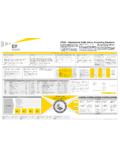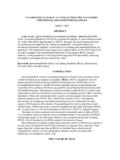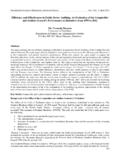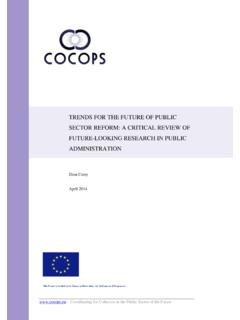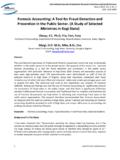Transcription of International Public Sector Accounting Standards …
1 International Research Report Public Sector January 2005. Accounting Standards Board International Public Sector Accounting Standards (IPSASs). and Statistical Bases of Financial Reporting: An Analysis of Differences and Recommendations for Convergence To serve the Public interest, IFAC will continue to strengthen the worldwide accountancy profession and contribute to the development of strong International economies by establishing and promoting adherence to high-quality professional Standards , furthering the International convergence of such Standards and speaking out on Public interest issues where the profession's expertise is most relevant. The International Federation of Accountants (IFAC) is the global organization for the accountancy profession. It works with its 163 member organizations in 119 countries to protect the Public interest by encouraging high quality practices by the world's accountants. IFAC. members represent million accountants employed in Public practice, industry and commerce, government and academe.
2 Its structure and governance provide for the representation of its diverse constituencies and interaction with external groups that rely on or influence the work of accountants. The International Public Sector Accounting Standards Board (IPSASB) is a Board of IFAC. It develops Accounting Standards for the Public Sector . (At its November 2004 meeting, the IFAC. Council approved a change in the name of the Public Sector Committee to the International Public Sector Accounting Standards Board (IPSASB)). Copies of this Research Report may be downloaded free of charge from the IFAC website at No responsibility for loss occasioned to any person acting or refraining from action as a result of any material in this publication can be accepted by the authors or publisher. International Federation of Accountants 545 Fifth Avenue, 14th Floor New York, NY 10017 USA. Fax: +1 212-286-9570. Copyright January 2005 by the International Federation of Accountants. All rights reserved. Permission is granted to make copies of this work to achieve maximum exposure and feedback provided that each copy bears the following credit line: Copyright by the International Federation of Accountants.
3 All rights reserved. Used by permission.. For more information, contact ISBN 1-931949-40-9. Views Expressed in this Research Report The views expressed, and recommendations made, in this Research Report are those of the authors who developed the Matrix that is at the core of this Report and the other members of Working Group I (WGI) of the International Task Force on Harmonization of Public Sector Accounting (TFHPSA) who met in Paris, France in February 2004 (see list of WGI members on page v of this Report). They are not necessarily the views of the organizations to which WGI. members belong, nor of other members of WGI who were not present at that meeting. Similarly, they are not necessarily the views of the International Public Sector Accounting Standards Board (IPSASB). Preface International Public Sector Accounting Standards (IPSASs). International Public Sector Accounting Standards (IPSASs) deal with issues related to the presentation of annual general purpose financial statements (GPFSs) of Public Sector reporting entities other than government business enterprises (GBEs).
4 GBEs apply International Financial Reporting Standards (IFRSs) issued by the International Accounting Standards Board (IASB). GPFSs are those financial statements intended to meet the needs of users who are not in a position to demand reports tailored to meet their specific information needs. Users of GPFSs include taxpayers and ratepayers, members of the legislature, creditors, suppliers, the media, and employees. The objectives of GPFSs are to provide information useful for decision-making, and to demonstrate the accountability of the entity for the resources entrusted to it. As at June 30, 2004, twenty Accrual Basis IPSASs and a comprehensive Cash Basis IPSAS had been issued. The issuance of these IPSASs establishes a core set of financial reporting Standards for those Public Sector entities to which the Standards apply. The accrual basis IPSASs issued as at June 30, 2004 are based on IFRSs to the extent that the IFRS requirements are applicable to the Public Sector . The International Public Sector Accounting Standards Board's (IPSASB's) current work program includes: As its first priority, the development of IPSASs dealing with a range of Public Sector specific issues.
5 As its second priority, ongoing convergence of IPSASs with IFRSs where appropriate for the Public Sector ; and As its third priority, convergence with the statistical bases of financial reporting. The IPSASB's work program is updated before each meeting to reflect progress made and emerging issues. It can be viewed on the IPSASB page of the IFAC website at Statistical Bases of Financial Reporting In June 2003, the Public Sector Committee (PSC now the IPSASB) of IFAC initiated a meeting of officers of relevant International organizations the International Monetary Fund (IMF), Eurostat, and the Organisation for Economic Co-operation and Development (OECD) and some national organizations that had been working on convergence issues in relation to Accounting and statistical bases of financial reporting the United Kingdom Treasury, United Kingdom Office of National Statistics and the Australian Accounting Standards Board. The purpose of that meeting was to: identify differences in the information reported by IPSASs, the IMF's Government Finance Statistics Manual 2001 (GFSM 2001) and European system of accounts (ESA95)/ESA95.
6 Manual of government deficit and debt (EMGDD);. consider whether these differences are necessary for the different objectives of those systems; and identify a process to eliminate or reduce any unnecessary or unintended differences. i This initiative has further developed with the establishment of the International Task Force on Harmonization of Public Sector Accounting (TFHPSA). As indicated in the TFHPSA mandate reproduced at page iv of this Report, the purpose of the TFHPSA is to examine ways to minimize unnecessary differences between Accounting and statistical bases of financial reporting and to make recommendations to the IPSASB, IMF and various groups involved in providing input to the update of the System of National Accounts 1993 (1993 SNA) by 2008. The TFHPSA is chaired by the IMF. The Chair of the IPSASB is a member of the TFHPSA. The TFHPSA includes two Working Groups: Working Group I (WGI) that focuses on issues related to the harmonization of Accounting and statistical bases of financial reporting; and Working Group II (WGII) that focuses on issues related to the harmonization of GFSM 2001 and 1993 SNA/ESA95.
7 WGI made the following recommendations on priority convergence issues to the, then, PSC at its March 2004 meeting: The development of an IPSAS that allows or encourages disclosure of information about the general government Sector (GGS) (as defined in statistical bases of financial reporting). in whole of government GPFSs, specifies rules when a government elects to make such disclosures, and acknowledges that other sectors may also be disclosed in a manner similar to the GGS information;. The development of a long-term project on reporting financial performance that splits the comprehensive result into two components that aligns as far as possible with the split between transactions and other economic flows adopted in statistical bases of financial reporting; and The development or amendment of IPSASs that will require or allow the adoption of current values in IPSASs. The Research Report This Report was prepared by the following members of WGI: Ian Mackintosh, Chairman UK Accounting Standards Board.
8 Robert Keys, Senior Project Manager, Australian Accounting Standards Board;. Betty Gruber, Australian Bureau of Statistics/IMF; and Paul Sutcliffe, IPSASB Technical Director. Key elements of the Report were discussed and agreed by members of WGI who met in Paris, France in February 2004. The Report is intended to provide input to the work of various groups who have an interest in converging the requirements of Accounting and statistical bases of financial reporting. Views Expressed The membership of WGI is still developing. The views expressed in this Research Report are those of the authors who developed the Matrix that is at the core of this Report and the other members of WGI who met in Paris, France in February 2004 (see list of WGI members on page v of this Report). They are not necessarily the views of the organizations to which WGI members ii belong, nor of other members of WGI who were not present at that meeting. Similarly, they are not necessarily the views of the IPSASB.
9 Acknowledgement The IPSASB commends members of WGI and the authors for their work in developing this Report. The IPSASB is of the view that the Report makes a significant contribution to the literature on differences between Accounting and statistical bases of financial reporting, and provides useful input to the long term convergence programs and opportunities for a number of bodies, including the IPSASB, the IMF and the groups concerned with the update of the 1993. SNA. Philippe Adh mar Chair, International Public Sector Accounting Standards Board International Federation of Accountants iii TASK FORCE ON HARMONIZATION OF Public Sector Accounting MANDATE. EXTRACTED FROM: , PREPARED AS AT OCTOBER 3, 2003. The objective of the TFHPSA is to study the feasibility of harmonization between the different International government Accounting and statistical Standards . These include the 1993 System of National Accounts (SNA), the 1995 European System of Accounts (ESA), the Government Finance Statistics Manual (GFSM 2001), the International Accounting Standards (IAS) / International Financial Reporting Standards (IFRS), and the International Public Sector Accounting Standards (IPSAS).
10 IPSAS are based on IAS / IFRS and future references will be made to IPSAS only, except in cases where there is any divergence between them. Specifically, the TFHPA is mandated: To identify differences that exist between the various Standards in the treatment of specific transactions, assets and liabilities. To identify areas where harmonization between the various Standards is considered feasible and desirable, and to take action to affect the necessary amendments. To identify areas where harmonization between the various Standards is not considered feasible or desirable, and to assess the implications of remaining differences between the Standards . To make recommendations to the Inter-Secretariat Working Group on National Accounts (ISWGNA), for amending the SNA. The TFHPSA consists of a Steering Group, the Task Force itself, and two Working Groups. The Steering Group of the Task Force consists of representatives of the relevant International organizations and associations engaged in this work and individual countries that have demonstrated major efforts in this field.






